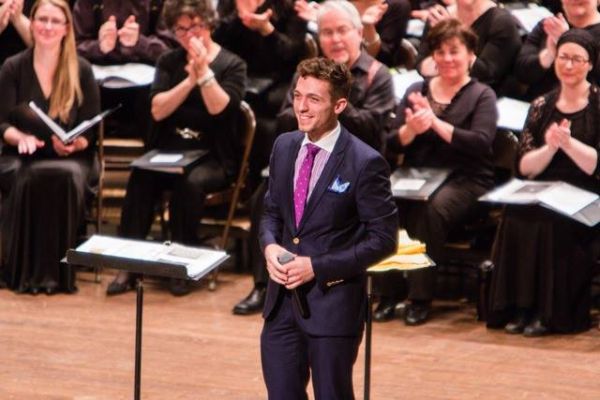Welcome!
Baltimore Choral Arts has seen a whirlwind of activity recently as our beloved 35 year maestro, Tom Hall, passed the baton after such an incredible tenure with this organization. Office walls are being repainted, marketing and press releases abound and music scores have been ordered for the upcoming season. An additional, unexpected change also came with the announcement that our stellar Executive Director Linda Moxley has been called back to the Baltimore Symphony Orchestra to serve as Vice President of Marketing and Communications, a truly well-deserved post. We are all thrilled that she will only be down the street and will become our musical neighbor.
As we launch into a new chapter in Baltimore Choral Arts’ illustrious history, it is important to all of us that we carry with us the legacy of excellence, artistic beauty, financial stewardship, and professional distinction that our treasured organization has enjoyed in its 52-year saga. We aim to use this heritage as a springboard into an exciting future that has been primed for us by the bold and incredible leaders who came before and served as musical and administrative mentors for those of us on the Board, in the office, on the choir risers, and on the conductor’s podium. We carry the past wherever we go, and our formative experiences and mentors become an essential part of how we operate and how we see the world.
This idea of legacy is what my first blog entry will consider. Those who have paved the way are the reason we stand on such solid ground. My entire identity as a musician is built upon the successes and ideas of others. Musical guides have been absolutely crucial to my development as an artist. At its core, musical education is following someone’s example, whether it be matching pitch, mirroring someone’s conducting gesture, or playing a passage of music in a specific way. Mentors are indispensable in the field of music. My story is no different.
If we were to talk about every single person who mentored me in my musical journey you would quickly exit this link and never return, but there are two who bear mention in the immediate term. The first is none other than Tom Hall, Baltimore Choral Arts Music Director Emeritus. While I have only known Tom for a matter of months, it has been made obvious that he passes on his endless gifts to Choral Arts by possessing a mentoring spirit and a genuine desire that his musical colleagues attain the highest versions of themselves musically and personally. He does this by empowerment and an infectious attitude of care-taking for the individuals who are involved in Baltimore Choral Arts. Tom has mentored me in the shift to Music Director in the most effective and unique way. He very meticulously showed me the ropes, but then carefully made sure to add that nothing has to be the way he did it. Bernard Kelvin Cline is a nationally acclaimed branding coach and author on modern economics and is quoted as saying “True mentors don’t make their mentees a clone of themselves”, and that rings true in the case of Tom Hall. The graciousness of Tom’s shepherding disposition was apparent in our discussions in that he has a desire to see those he is guiding come into their own understanding of how to maneuver musical and administrative ideas. This is undoubtedly the sign of a nuanced mentor and an effective leader.
My graduate studies centered on a central figure who became a close mentor and great friend. Simon Halsey (who is at the helm of the London Symphony Chorus, City of Birmingham Symphony Chorus, University of Birmingham choral music, and at the time was the Chief Conductor of the Berlin Radio Choir) has an immense desire to pass on his encyclopedic knowledge to the next wave of musical leaders. At the time I yearned for mentorship and a musical authority to model my artistic creed after, and with Simon I got a perfect guru. This intense period of musical study was filled with hands-on learning, hundreds of hours of podium time in front of a myriad of ensembles, and concentrated instruction with Simon. He has tenacity, a highly contagious spirit, and a kind of infectious energy that makes his mentees want to follow him straight off a cliff. He too also possesses the “Tom Hall trait” of not desiring to make carbon copies of himself in his protégées. However, at no time did Simon create an atmosphere of comfort: in our very first conducting lesson, the principal cellist of the CBSO sat in on the lecture and after I had been conducting for about 60 seconds, Simon stopped me and turned to the cellist and said, “So tell me what you don’t like about Blake’s gesture in this passage,” and thus began a half hour discussion on the peculiarities of my conducting technique. The intensity of Simon’s mentoring style shaped me into the musician I am now and is a testament to the importance of emulating (to a degree) those mentors whose coaching you value.
As we step into this next season of Baltimore Choral Arts’ illustrious history, I hope to carry all these influences with me. Only through channeling the knowledge of our predecessors will we be able to be the best conduits of their legacy while also bringing the best versions of ourselves to our work. I hope one day to be as impactful to people as my mentors have been to me. Legacy and the celebration of others’ talents and contributions is how Baltimore Choral Arts has thrived. This attitude of legacy and valuing of others will be how we will fling ourselves into our exhilarating future!


